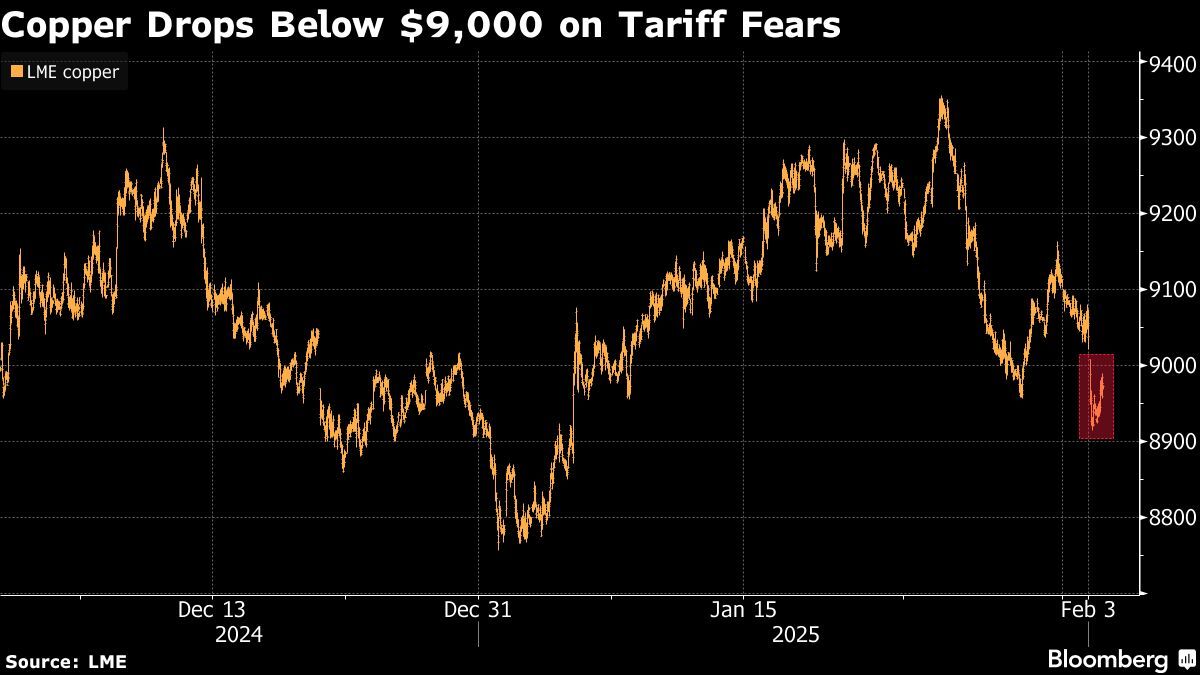
(Feb 3): Copper, aluminium and iron ore led metals lower after US President Donald Trump imposed tariffs on China, Canada and Mexico, threatening a trade war that could sap global economic growth.
The red metal, an industrial bellwether, fell as much as 1.5% on the London Metal Exchange (LME), before paring some losses. Steelmaking staple iron ore also dropped by as much as 3.5% in Singapore on Monday, while Chinese markets remained closed for the Lunar New Year holidays.
Trump announced a 10% levy on imports from China, as well as 25% tariffs on Canada and Mexico, that will take effect from Tuesday. The impact on the dollar, with a gauge up by as much as 1.2%, also weighed on metals as a costlier US currency makes them more expensive for most buyers. China’s Commerce Ministry vowed “corresponding countermeasures”, without elaborating, and also said it would file a complaint at the World Trade Organization.
Aluminium is likely to be the most heavily disrupted commodity, as Canada accounted for 69% of US imports in 2023, George Heppel, an analyst at BMO Capital Markets, said in an emailed note.
“We expect this announcement to drive further volatility of US commodity exchanges, as investors try to price in the risk of Trump further honouring his commitment to universal tariffs,” Heppel wrote. “Heightened disruption will also be seen in the aluminium market, with US premiums likely to spike until Canadian producers and US consumers alike can reroute supply chains to avoid the new duties.”
A global trade war may spur inflation, keep interest rates higher for longer, and will be a headwind for global growth and metals demand. It could also lead to nations restricting exports of critical minerals. China, the world’s largest consumer of most metals, is still struggling to revive economic growth that hasn’t fully recovered from Covid-19, although it will now likely step up measures to stimulate expansion.
China manufacturing
China’s manufacturing activity unexpectedly declined for a second straight month in January, according to a report released by Caixin and S&P Global on Monday. The reading reinforced the urgency for Beijing to boost economic stimulus in the face of US tariffs.
“While the energy transition and a recovery in economic growth in Europe would support metals demand, Trump’s proposed tariffs will limit demand growth” as business confidence will stay subdued, ANZ Group Holdings Ltd said in a note by analysts Daniel Hynes and Soni Kumari. Credit growth in China remains depressed, but deployment of additional stimulus will be a “wild card for metals demand”, they said.
Copper had fallen 0.9% to US$8,970.50 (RM40,134.02) on the LME as of 10.08am in London, after dropping 2.5% last week. Aluminium fell 0.6% to US$2,579, as all metals declined on the exchange. Iron ore lost 1.4% to trade at US$104.25 a ton in Singapore.
China’s domestic markets reopen on Wednesday.
The impact of tariffs on commodity prices depends on several factors, the most important of which is how if affects the economies of China and other emerging markets, Jefferies analyst Christopher LaFemina said in a note. The one market that is likely to benefit is US steel, as more expensive imports should support higher domestic prices, he said.
Uploaded by Tham Yek Lee
- Sapura Resources sues ex-MD Datuk Shahriman and others for over RM3 mil in damages
- Anwar receives courtesy visit from tech giant Oracle, discusses AI and digital innovation
- Singapore man accused of Nvidia chip fraud wields global connections
- Stocks extend drop, dollar falls on tariff woes
- Trump’s manufacturing dreams clash with business owners’ reality

